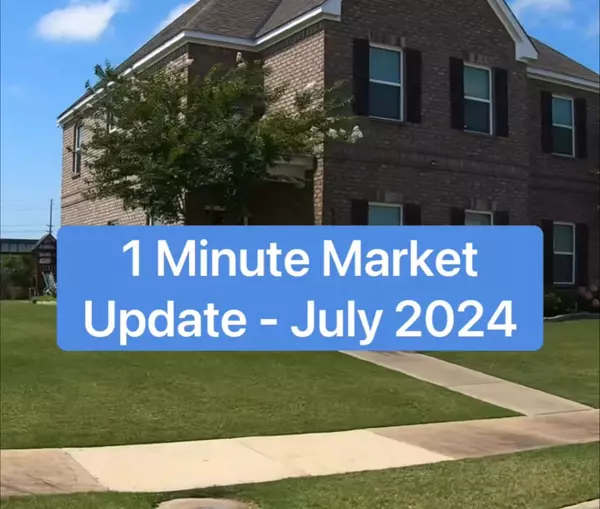
6 Things You Need to Know About Upcoming Changes to the Real Estate Industry
A little backstory: Back in March, the National Association of Realtors (NAR) agreed to a settlement deal. The organization agreed to both a monetary settlement as well as real estate practice changes aimed at providing more transparency regarding how real estate agents are paid. But how exactly does that change things for you? There are two main differences you may be hearing about: Offers of compensation for buyer brokers or buyer agents can no longer be made on the Multiple Listing Service (MLS). Real estate agents must enter into a written agreement with a homebuyer before giving them a tour of a property. Headlines might make these changes seem overwhelming. And while some of the paperwork is new, the reality is that the majority of professionals in the industry will continue to provide the same service they always have. To help you get a better understanding of what this means for you, here are six key things home buyers and sellers should know about the changes going into effect on August 17, 2024. What Changes Mean For Homebuyers #1—Homebuyer Agreements Your real estate agent needs to have a written agreement signed before they can show you homes. This doesn’t mean you are locked in for life—some agreements can be for one property, some for one week, and some for a longer period of time. Be sure to ask about the different options available when interviewing buyer agents, and make sure you understand exactly what services are included. #2—Know What You're Paying For This agreement will clearly outline your agent's compensation. If the agreement is not specific, or if you have questions, ask for clarification (and get it in writing) before signing anything. And, just like before, agent fees are negotiable. This settlement doesn't change that. #3—Seller Deals Still Exist Sellers can still offer to cover some of your closing costs, and even the buyer agent fees, as an incentive. While you won't see the seller’s offers to buyer agents on the MLS listings anymore, that doesn't mean they're gone. Your agent can find out if the seller is offering buyer agent compensation (or negotiate for it should you decide to make an offer on a property). What Changes Mean For Home Sellers #1—The Power of Choice You’re still in control! You can decide if you want to offer compensation to buyer brokers. When interviewing your listing agent, ask about the pros and cons of offering buyer agent compensation to help you determine what the best option is for your situation. #2—Transparent Terms Your listing agent must obtain your approval before making any offer of payment to buyer brokers. If you choose to offer compensation, the terms must be transparent and made in writing—including how much and how it will be paid. #3—MLS Dos and Don’ts As a seller, you can no longer put offers of buyer broker compensation on the MLS. (This must happen off MLS.) However, you can still offer buyer concessions on the MLS, like buyer closing costs. Final Thoughts These changes are designed to make the process of agent compensation when buying or selling a home more transparent. That being said, there are going to be different options available, so it’s important you take the time to understand them all. By working with a knowledgeable real estate agent, you can ensure that your home buying or selling experience is positive and successful. For more information about these changes, visit facts.realtor or schedule a discovery session with me here. https://calendly.com/brittdowling/30min

6 Tips to Secure the Best Home Insurance Rates
Now, more than ever, having the right home insurance is essential. But with rates on the rise, how do you ensure you're getting the best coverage without breaking the bank? Let's explore the ins and outs of home insurance and uncover some strategies to secure the best deal for your home in [Your Local Market]. Understanding the Rising Costs of Home Insurance Since 2019, home insurance rates have surged by 37.8% across the United States. Several factors contribute to this rise: Inflation and Home Prices: As home prices increase, so does the cost to insure them. Inflation has also driven up the cost of building materials, making repairs more expensive. Natural Disasters: Climate change has led to more frequent and severe natural disasters, resulting in higher claims and, consequently, higher premiums. Insurance Company Costs: Insurance companies are facing higher costs to repair homes and are passing these costs on to consumers. While this is news no one wants to hear, there are things you can do to secure a lower rate. Let’s take a look. How to Find the Best Home Insurance Rates 1. Shop Around and Compare Quotes Just like you wouldn't buy a house without looking at a few options, don't settle for the first home insurance quote you get. Compare quotes from multiple providers to see who offers the best rates for the coverage you need. I can help connect you with vetted home insurance representatives in the Montgomery and Tri-County area. 2. Bundle Your Policies Many insurance companies offer discounts if you bundle your home insurance with other policies, such as auto insurance. This can lead to significant savings and simplify your insurance management. 3. Improve Your Home's Security Insurance companies often provide discounts for homes with enhanced security features. Installing alarm systems, smoke detectors, and deadbolt locks can reduce your premium. Some insurers even offer discounts for eco-friendly home upgrades. 4. Increase Your Deductible Opting for a higher deductible can lower your monthly premium. However, ensure you choose a deductible that you can afford in case you need to make a claim. 5. Make Strategic Home Improvements Insurance companies look at the age and condition of your property—and pay close attention to exterior features like the roof, windows and doors. These renovations can help you lower your home insurance rates. Adding features like storm shutters or upgrading electrical systems can also make a difference. 6. Maintain a Good Credit Score In many states, insurance companies use your credit score to determine your premium. A higher credit score can result in lower rates. Make sure to pay bills on time, reduce debt, and monitor your credit report for any errors. 6. Review Your Coverage Annually Your insurance needs may change over time, so it's essential to review your coverage annually. Ensure that your policy still meets your needs and that you're not paying for unnecessary coverage. Conclusion Securing the best home insurance at the best price requires a bit of research and strategic planning. By understanding the factors driving up insurance costs and taking proactive steps to reduce your premium, you can protect your home without overspending. Remember to review your policy regularly and stay informed about changes in the insurance landscape. Your home is one of your most valuable assets—make sure it's adequately protected.

Top Tips for a Smooth and Stress-Free Home Sale
Selling a home is considered more stressful than planning a wedding. Yes, you read that right! According to a recent study by Opendoor, selling a home is 35% more stressful than planning to exchange vows. And for many homeowners aged 55 and over, selling a home is often intertwined with major life transitions, adding another layer of emotional complexity. This statistic might surprise some, but it highlights the significant emotional and logistical hurdles involved in selling a property. Whether you're downsizing, relocating, or simply embarking on a new chapter, understanding the potential stressors and planning effectively can make a world of difference. Why is Selling a Home So Stressful? Among 55+ Americans, selling a home (65%) ties with starting a new job (65%) as the most stressful life events. These events are considered more stressful than buying a home (62%) and planning a wedding (48%). Women in this age group find home real estate transactions significantly more stressful than men, with 72% of women citing selling a home as the most stressful event compared to 57% of men. Here are just a few of the reasons selling a home can be overwhelming: Emotional Attachment Homes are more than just structures; they hold memories and sentimental value. Of those surveyed, 66% feel attached to their homes, and 56% have lived in their homes for 15 years or more. This makes leaving a home a bittersweet mix of emotions, making the selling process emotionally taxing. Uncertainty and Financial Pressure Selling a home involves many uncertainties, such as finding a buyer, negotiating prices, and dealing with market fluctuations. The financial stakes are high, and the pressure to get the best deal can add to the stress. Coordination of Logistics From staging and showing the home to handling paperwork and moving logistics, the process requires meticulous planning and coordination. This can be overwhelming, especially for those who are also juggling other life responsibilities. Tips for Managing Home Selling Stress Understand Your Selling Options Knowing your options and planning ahead can significantly reduce the stress of selling a home. Partnering with a real estate professional allows them to handle marketing, negotiations, and paperwork—not to mention an average of $34,000 more in profit, according to a recent study. Another option is iBuyers, which is when companies buy homes directly. These often offer a fast and convenient sale, though offers are typically lower than a traditional sale. Selling yourself (FSBO) requires a significant effort in marketing, negotiations, and legal aspects. This can save on agent commissions, but typically results in a lower sale price. Set Realistic Expectations Understanding the current market conditions and setting realistic expectations can prevent disappointments. Today’s market is not like the one in 2021-2022! If working with a professional, discuss your goals with your real estate agent and be prepared to make changes based on what’s happening locally. Simplify the Process Consider decluttering and staging your home early in the process. A well-presented home can attract buyers more quickly, reducing the time your home is on the market. Additionally, having all necessary documents organized and ready can expedite the closing process. Final Thoughts Selling a home is undoubtedly an emotional experience. However, understanding the factors that contribute to this stress and implementing strategies to manage it makes the process more manageable. By planning ahead and setting realistic expectations you can navigate the home selling journey with greater ease and confidence.
Categories
- All Blogs (35)
- Living in Montgomery Alabama (23)
- Living in Pike Road Alabama (1)
- Living in Prattville Alabama (1)
- Living in Wetumpka Alabama (3)
- Montgomery Alabama Homes for Sale (11)
- Montgomery Alabama Real Estate (11)
- Pike Road AL Real Estate (1)
- Pike Road Homes for Sale (1)
- Prattville Alabama Homes for Sale (1)
- Prattville Alabama Real Estate (1)
- Real Estate Tips (9)
- Things to do in Montgomery Alabama (5)
- Things to do in Wetumpka Alabama (1)
- Wetumpka Alabama Homes for Sale (2)
- Wetumpka Alabama Real Estate (2)
Recent Posts










